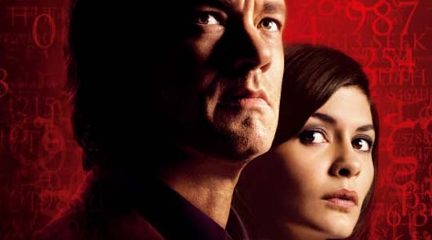
So now they're making bullshit stackable.
A survey that made the papers this week indicates that a solid constituency of Canadians -- 17 percent -- believes that the basic plot of Dan Brown's The Da Vinci Code is true. Jesus didn't die on the cross, he got hitched to Mary Magdalene and had kids; all of which to be eventually uncovered by Tom Hanks in the movie released next month.
It's enough to make you drive nails through your palms and curse God. Not because people are increasingly rejecting orthodox Christian dogma -- that bit of news is the sole nugget of comfort here. The sad part is that so many people are so in love with bullshit that they merely switch brands from time to time.
It's important that the New Testament and other religious scriptures ought to be treated as subjects for scholarship and objective analysis, rather than the revealed word of the Lord. It may well be the most important philosophical issue of our young century. The ongoing religious and social struggle between humanists and fundamentalists of every stripe is shaping our own society and our relations with other cultures. From Danish cartoons to gay rights to stem cell research to the Oscar for best picture, religious wars are being fought on every social front. The case for human progress against sectarian superstition must be made constantly, from schoolrooms to political campaigns and beyond.
'Secret clues'
The fact that The Da Vinci Code, a runaway bestseller, soon-to-be-blockbuster film and a cultural and marketing phenomenon, has come along to encourage its audience to look more critically at the New Testament ought to be a cause for joy. Instead, it's a wasted opportunity. Worse, the book has hijacked a crucial debate. Biblical scholarship has been trivialized; transformed into just another field for conspiracy nuts. The public battle lines now seem to be drawn between those who believe the Bible is literally true and those who believe in something called the Priory of Sion and a potboiler mystery centred in the Vatican. Is this progress?
The Da Vinci Code taps into a deep, public need for dark conspiracies, malevolent forces and Knights Templar. It seems to be an almost Pavlovian response these days. Google "9/11" looking for factual accounts of the World Trade Centre attacks and you will find yourself instead wading hip deep through conspiracy tales whose creators rarely pause to consider plausibility in their rush toward mystery and adventure. Underlying it all is a disturbingly lax attitude toward evidence.
What people ought to know about the New Testament is not that it contains secret clues known only to Leonardo Da Vinci or Marilyn Monroe, telling the story of Jesus' secret life as a Nazarene bartender or an insurance tout in Thrace. It's that each Gospel was written with an agenda. Created decades after the events they purport to describe, the four Gospels have limited value as historical journalism or as a basis for factual investigation. Constructing theories on the basis of New Testament accounts is like trying to draw an accurate map of ancient Britain by reading tales of King Arthur. It's error piled on myth -- you're just stacking bullshit.
The recent translation of the Gnostic Gospel of Judas demonstrates the way such manuscripts were developed. Despite widespread media reporting that treated the work like a newly uncovered weapon in a cold murder case, the real value of the Judas Gospel is to illustrate that these works were, in fact, competing arguments and part of an ongoing theological debate about the nature of Jesus. The four New Testament Gospels are older than the Judas Gospel and, some argue, more historically accurate. But how accurate? The authors we know today as Matthew, Mark, Luke and John were engaged in both evangelism and politics; they spun their tales to fit their audiences, to influence the direction of the early church and to grind political axes against their enemies.
'Gospel villains'
Why else would the Pharisees, virtually powerless in Jesus' time, figure so prominently as Gospel villains? When Jesus was alive, power in Jerusalem was held by Temple priests. After the fall of the Temple in AD 70, the Jewish priests lost their power base and their authority eventually flowed to the Pharisees. The Gospel writers, intent on attacking the Jewish establishment they were dealing with in their own era, thus focused on the Pharisees as the Jewish traitors who betrayed Jesus. Not surprisingly, Gospel writing reflects the time of the authors as much as it does the life of Jesus.
The battle is being played out in bookstores this spring, with fascinating works sitting alongside the specious. Bart Ehrman's new book Misquoting Jesus is an invaluable history of Biblical mistranslation and even willful alteration. As Ehrman recounts, famous passages of the Gospels, such as the story of the woman taken in adultery in the Gospel of John ("He that is without sin among you, let him first cast a stone at her"), and the final 12 verses of Mark's gospel, were not even in the original manuscripts -- they were added later. Other passages, some crucial, were altered by translators in order to conform to church doctrine. It all points to the ludicrous nature of fundamentalism itself. When people say the Gospels are literally true, the question is "Which versions?"
On the other hand, there are the books of Michael Baigent. Baigent was one of a trio of authors behind Holy Blood, Holy Grail, the pseudo-historical account that helped inspire Da Vinci author Brown (although not actionably, ruled the British courts). Baigent's new book is The Jesus Papers, and it proves once again that Baigent is no Ehrman. He's fond of spinning wild theories, backed only by slippery arguments and supposition (e.g. Pilate actually spared the life of Jesus, because, well, it made sense to spare a guy who advocated paying Roman taxes. Or maybe Pilate secretly wanted to meet Mel Gibson. Anything's possible, apparently.) Alongside Brown, Baigent is out there muddying the waters of public theological discourse.
Opening up serious discussion of the Gospels -- their historical and cultural context, how they were written, what they were intended to accomplish, what they can tell us about the first century church -- is a worthy and important goal. Watching Tom Hanks dodging bullets at the Vatican is not going to help. Enjoy the movie, but don't forget to take your popcorn with a large grain of salt.
Steve Burgess is The Tyee's at-large culture critic.
















Tyee Commenting Guidelines
Comments that violate guidelines risk being deleted, and violations may result in a temporary or permanent user ban. Maintain the spirit of good conversation to stay in the discussion.
*Please note The Tyee is not a forum for spreading misinformation about COVID-19, denying its existence or minimizing its risk to public health.
Do:
Do not: